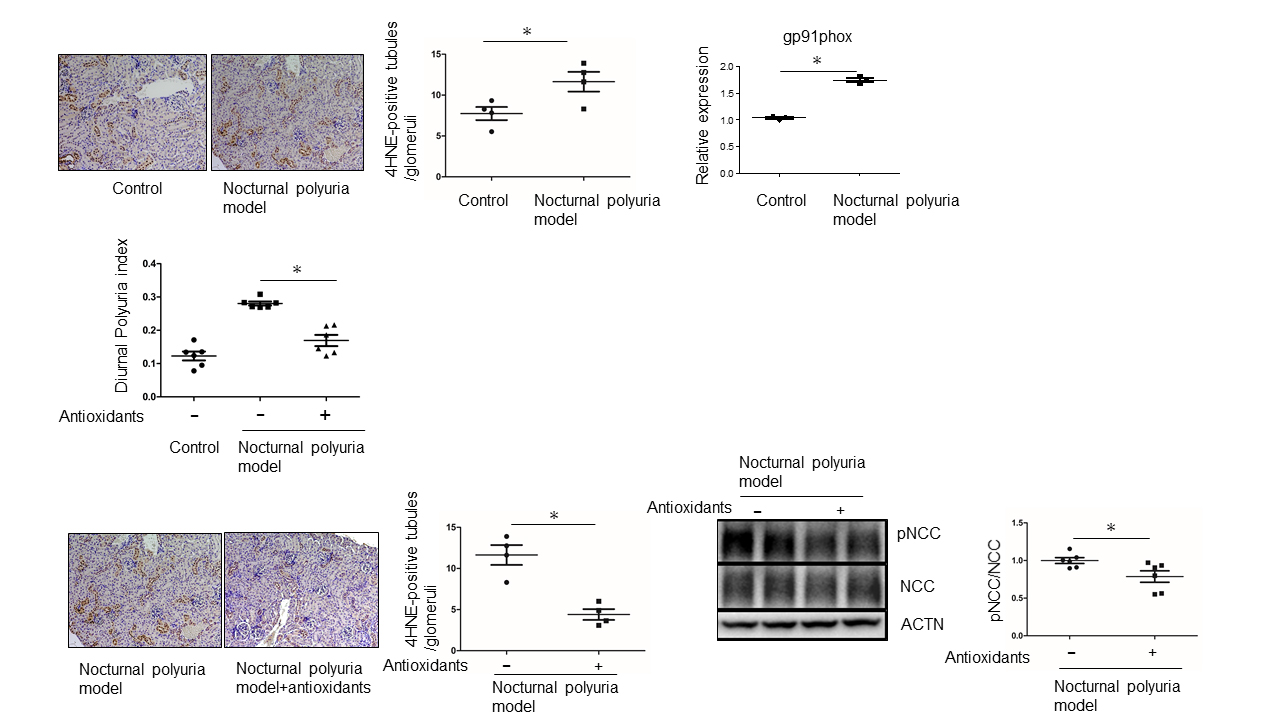Back
Poster, Podium & Video Sessions
Moderated Poster
MP49: Urodynamics/Lower Urinary Tract Dysfunction/Female Pelvic Medicine: Basic Research & Pathophysiology
MP49-09: Oxidative stress drives nocturnal polyuria via intrarenal SPAK-NCC pathway: a therapeutic potential of a novel antioxidant, Silicon component agents.
Sunday, May 15, 2022
4:30 PM – 5:45 PM
Location: Room 228
Yosuke Sekii*, Hiroshi Kiuchi, Takahiro Imanaka, Sohei Kuribayashi, Koichi Okada, Kentaro Takezawa, Shinichiro Fukuhara, Norio Nonomura, Suita, Japan
- YS
Yosuke Sekii
Osaka University
Poster Presenter(s)
Introduction: For decades, the mechanisms that cause nocturnal polyuria in the elderly have been poorly understood. We have recently shown in a novel animal model that it is triggered by inappropriate activation of the SPAK-NCC pathway in the kidney. The pathway is, in part, regulated by oxidative stress, and we hypothesized that oxidative stress may cause nocturnal polyuria. In this study, we aimed to show the impact of oxidative stress on nocturnal polyuria and to evaluate the efficacy of a novel antioxidant, Silicon component agents.
Methods: 19-week-old C57BL6/J male mice were fed L-NAME (NO synthase inhibitor) and a 1% high-salt diet for 2 weeks to create a nocturnal polyuria model. Oxidative stress in kidney was assessed by immunohistochemical staining for 4-hydroxynonenal (4-HNE) and real-time PCR of NADPH oxidase subunit, which regulates the production of ROS. Silicon component was used as antioxidant stress agents: The silicon component we co-developed is orally ingestible and features sustained hydrogen generation to inhibit oxidative stress production. Urine volume was measured by the aVSOP method after two weeks of treatment with the silicone-containing diet or silicone-free diet. The diurnal polyuria index(inactive urine volume /daily urine volume) was calculated for the index corresponding to nocturnal polyuria in humans. Intrarenal NCC activation was assessed by phosphorylation of NCC using Western blotting.
Results: 4-HNE-positive cells in the distal renal tubules and subunit of NADPH oxidase were significantly increased in nocturnal polyuria group compared with control (P <0.05), suggesting the association between oxidative stress and nocturnal polyuria. Oral treatment with silicone component decreased these oxidative stresses. In addition, the component inhibited phosphorylation of NCC, leading to decease of diurnal polyuria index (P <0.05).
Conclusions: Oxidative stress overactivated intrarenal SPAK-NCC pathway and caused nocturnal polyuria, which was improved by Silicon component agents. Oxidative stress plays a crucial role in nocturnal polyuria, and Silicon component agents could be a promising treatment for age-related nocturnal polyuria.
Source of Funding: Japan Society for the Promotion of Science (JSPS) (Grant number: JP19K18582).

Methods: 19-week-old C57BL6/J male mice were fed L-NAME (NO synthase inhibitor) and a 1% high-salt diet for 2 weeks to create a nocturnal polyuria model. Oxidative stress in kidney was assessed by immunohistochemical staining for 4-hydroxynonenal (4-HNE) and real-time PCR of NADPH oxidase subunit, which regulates the production of ROS. Silicon component was used as antioxidant stress agents: The silicon component we co-developed is orally ingestible and features sustained hydrogen generation to inhibit oxidative stress production. Urine volume was measured by the aVSOP method after two weeks of treatment with the silicone-containing diet or silicone-free diet. The diurnal polyuria index(inactive urine volume /daily urine volume) was calculated for the index corresponding to nocturnal polyuria in humans. Intrarenal NCC activation was assessed by phosphorylation of NCC using Western blotting.
Results: 4-HNE-positive cells in the distal renal tubules and subunit of NADPH oxidase were significantly increased in nocturnal polyuria group compared with control (P <0.05), suggesting the association between oxidative stress and nocturnal polyuria. Oral treatment with silicone component decreased these oxidative stresses. In addition, the component inhibited phosphorylation of NCC, leading to decease of diurnal polyuria index (P <0.05).
Conclusions: Oxidative stress overactivated intrarenal SPAK-NCC pathway and caused nocturnal polyuria, which was improved by Silicon component agents. Oxidative stress plays a crucial role in nocturnal polyuria, and Silicon component agents could be a promising treatment for age-related nocturnal polyuria.
Source of Funding: Japan Society for the Promotion of Science (JSPS) (Grant number: JP19K18582).


.jpg)
.jpg)